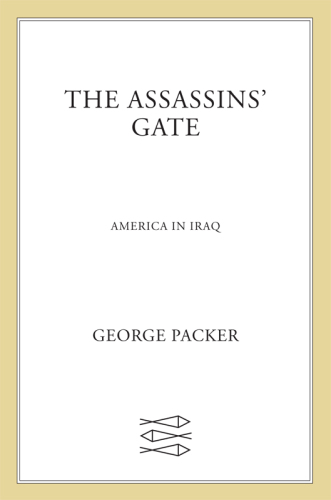
The Assassins' Gate
America in Iraq
کتاب های مرتبط
- اطلاعات
- نقد و بررسی
- دیدگاه کاربران
نقد و بررسی

June 6, 2005
Reviewed by
Christopher Hitchens
It is extremely uncommon for any reporter to read another's work and to find that he altogether recognizes the scene being described. Reading George Packer's book, I found not only that I was remembering things I had forgotten, but also that I was finding things that I ought to have noticed myself.
His book rests on three main pillars: analysis of the intellectual origins of the Iraq war, summary of the political argument that preceded and then led to it, and firsthand description of the consequences on the ground. In each capacity, Packer shows himself once more to be the best chronicler, apart perhaps from John Burns of the New York Times
, that the conflict has produced. (I say "once more" because some of this material has already appeared in the New Yorker
.)
A very strong opening section traces the ideas, and the ideologists, of the push for regime change in Iraq. Packer is evidently not a neoconservative, but he provides an admirably fair and lucid account of those who are. There is one extraordinary lacuna in his tale—he manages to summarize the long debate between the "realists" and the "neocons" without mentioning Henry Kissinger—but otherwise he makes an impressively intelligent guide. Of value in itself is the ribbonlike presence, through the narrative, of the impressive exile Iraqi dissident Kanan Makiya, upon whom Packer hones many of his own ideas. (I should confess that I myself make an appearance at this stage and, to my frustration, can find nothing to quarrel with.)
The argument within the administration was not quite so intellectual, but Packer takes us through it with insight and verve, giving an excellent account in particular of the way in which Vice President Cheney swung from the "realist" to the "neocon" side. And then the scene shifts to Iraq itself. Packer has a genuine instinct for what the Iraqi people have endured and are enduring, and writes with admirable empathy. His own opinions are neither suppressed nor intrusive: he clearly welcomes the end of Saddam while having serious doubts about the wisdom of the war, and he continually tests himself against experience. The surreal atmosphere of Paul Bremer's brief period of palace rule is very well caught, but the outstanding chapter recounts a visit to the northern city of Kirkuk and literally "walks" us through the mesh of tribal, ethnic and religious rivalry. The Iraq debate has long needed someone who is both tough-minded enough, and sufficiently sensitive, to register all its complexities. In George Packer's work, this need is answered. (Oct. 15)
Christopher Hitchens is a columnist for
Vanity Fair. His book
Thomas Jefferson: Author of America (HarperCollins) was published last week.

























دیدگاه کاربران